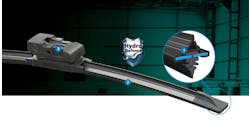You probably don’t need more evidence that supply chain issues are impacting the commercial vehicle parts market.
However, the May 2022 HDMA Pulse Survey produced by FTR Transportation Intelligence for the Heavy Duty Manufacturers Association provided corroboration of what you already knew. “While respondents indicate strong demand, ongoing supply chain disruptions continue to hamper the ability of suppliers to meet full demand,” the report said.
The problem, of course, isn’t new. Nearly one year ago, in a column entitled Let's Talk About the Supply Disruptions, HDMA noted that “product shortages have impacted society to an extent that was unforeseen prior to the pandemic—and there is no doubt that these issues have taken a dramatic toll on the commercial vehicle industry.”
Unfortunately, as HDMA pointed out, there is no simple or immediate solution. Back then, the association anticipated that shortages in the OEM and aftermarket supply chains serving the commercial vehicle marketplace would continue into mid-2022. It now appears that the issues that have caused supply disruptions will last longer.
While manufacturers struggle with raw material and product shortages, an even bigger challenge for the commercial vehicle industry can be finding parts that are not routinely carried in inventory locally.
Approximately 20% of all the parts on commercial vehicles fit into that category so fleets and service providers have to use a time-consuming process to find and buy them. The key is to be source-agnostic and to partner with a large number of suppliers so they can help every customer.
For fleets and commercial vehicle service providers, the consequences of replacement parts supply issues are obvious. Extended downtime for maintenance and repairs leads to a loss of revenue for their company or their customers. A loss of paid miles for drivers adds to ongoing recruiting and retention challenges.
Parts sourcing issues also put an added burden on shop management and parts department personnel by requiring them to spend large amounts of time trying to find less frequently used parts, along with common maintenance items. Especially for unconventional items, they’re burning up a lot of time searching.
Today’s ongoing supply chain issues have heightened those issues for commercial vehicle service operations. Those who are succeeding at rising to the challenge are service operations that have adjusted their parts sourcing and procurement strategies and who have relied on reputable and highly capable parts vendors and distributors.
David Seewack is the founder and CEO of FinditParts. Seewack is focused on transforming how heavy-duty truck and trailer parts are bought and sold. Founded in 2010, FinditParts is the No. 1 supplier of these parts online, with more than 10 million available from more than 1,800 manufacturers and customers in over 210 countries.
This article originally appeared on FleetOwner.com.



